1 of 6
Download to read offline
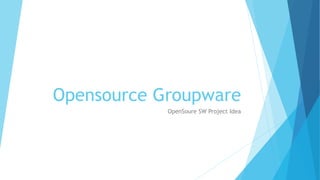
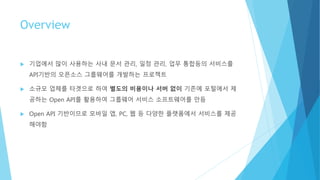
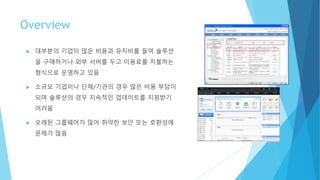
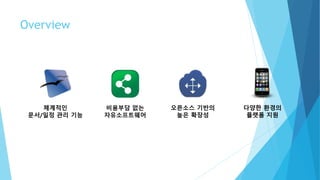
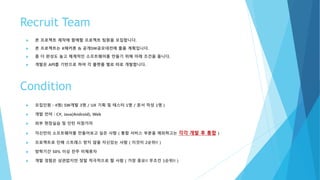
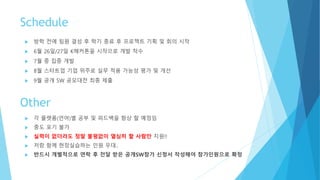
Ad
Recommended
2022 ßäćßģóßå©ßäŗßģ”ßå½ßäāßģ│ ßäåßģ”ßå½ßäÉßģ®ßäģßģĄßå╝ ßäīßģĪßäģßģŁ
2022 ßäćßģóßå©ßäŗßģ”ßå½ßäāßģ│ ßäåßģ”ßå½ßäÉßģ®ßäģßģĄßå╝ ßäīßģĪßäģßģŁssuserf875e6
╠²
ļ®śĒåĀļ¦ü ņ×ÉļŻī PPT ĒīīņØ╝200819 NAVER TECH CONCERT 07_ņŗĀņ×ģ iOS Ļ░£ļ░£ņ×É Ļ░£ļ░£ņŚģļ¼┤ ņĀüņØæĻĖ░
200819 NAVER TECH CONCERT 07_ņŗĀņ×ģ iOS Ļ░£ļ░£ņ×É Ļ░£ļ░£ņŚģļ¼┤ ņĀüņØæĻĖ░NAVER Engineering
╠²
200819 NAVER TECH CONCERT - Ļ╣Ćņāüļ»╝
ņŗĀņ×ģ iOS Ļ░£ļ░£ņ×É Ļ░£ļ░£ņŚģļ¼┤ ņĀüņØæĻĖ░ņø╣Ļ░£ļ░£ņ×É Ļ╣ĆņśüĒÖś ĻĖ░ņłĀĻ▓ĮļĀźņä£ & ņ×ÉĻĖ░ņåīĻ░£ņä£
ņø╣Ļ░£ļ░£ņ×É Ļ╣ĆņśüĒÖś ĻĖ░ņłĀĻ▓ĮļĀźņä£ & ņ×ÉĻĖ░ņåīĻ░£ņä£ņśüĒÖś Ļ╣Ć
╠²
- Ļ╣ĆņśüĒÖś / 80ļģäņāØ / ļé©
- ļ¦ī 8ļģä Ļ▓ĮļĀźņØś SI ņø╣Ļ░£ļ░£ņ×É ŌĆ©(ņ×Éļ░ö/ņ×Éļ░öņŖżĒü¼ļ”ĮĒŖĖ)
- ņ×Éņ▓┤ ņä£ļ╣äņŖżļź╝ ļ│┤ņ£ĀĒĢ£ ĒÜīņé¼ņŚÉ ŌĆ©ņĀĢĻĘ£ņ¦üņ£╝ļĪ£ ņ×ģņé¼ Ēؼļ¦Ø ŌĆ©(SI, ĒīīĻ▓¼ņ¦üņØĆ ņé¼ņ¢æ)ņĄ£ņĀäļ░® ņāØņĪ┤ļ▓Ģ - ĒöäļĪĀĒŖĖņŚöļō£ Ļ░£ļ░£ņ×ÉļĪ£ ņé┤ņĢäĻ░ĆĻĖ░
ņĄ£ņĀäļ░® ņāØņĪ┤ļ▓Ģ - ĒöäļĪĀĒŖĖņŚöļō£ Ļ░£ļ░£ņ×ÉļĪ£ ņé┤ņĢäĻ░ĆĻĖ░Hyeonjin Cho
╠²
CSS NITE in Seoul vol4.ļ»Ėļלņø╣ĻĖ░ņłĀņŚ░ĻĄ¼ņåīļŖö ņÖ£ Sencha ļź╝ ņ▒äĒāØĒĢśņśĆļŖöĻ░Ć?
ļ»Ėļלņø╣ĻĖ░ņłĀņŚ░ĻĄ¼ņåīļŖö ņÖ£ Sencha ļź╝ ņ▒äĒāØĒĢśņśĆļŖöĻ░Ć?ļ»Ėļלņø╣ĻĖ░ņłĀņŚ░ĻĄ¼ņåī (MIRAE WEB)
╠²
ļ»Ėļלņø╣ĻĖ░ņłĀņŚ░ĻĄ¼ņåīļŖö ņÖ£ Sencha ļź╝ ņ▒äĒāØĒĢśņśĆļŖöĻ░Ć?
SenchaļŖö ĒĢ£ĻĄŁ ņāüĒÖ®ņŚÉņä£ SIļéś ņø╣ņĢĀĒöīļ”¼ņ╝ĆņØ┤ņģś ņĀ£ņ×æņŚģņ▓┤ļōżņŚÉĻ▓ī ņĀüĒĢ®ĒĢ£ Ēł┤ņØ┤ļŗż.Fast campus ņĢłļō£ļĪ£ņØ┤ļō£ ņĢ▒ Ļ░£ļ░£ ĒöäļĪ£ņĀØĒŖĖ CAMP (Fastground)
Fast campus ņĢłļō£ļĪ£ņØ┤ļō£ ņĢ▒ Ļ░£ļ░£ ĒöäļĪ£ņĀØĒŖĖ CAMP (Fastground)ļÅÖņÜ▒ ĒĢś
╠²
Fast campus ņĢłļō£ļĪ£ņØ┤ļō£ ņĢ▒ Ļ░£ļ░£ ĒöäļĪ£ņĀØĒŖĖ CAMP ņØś ņśżļ”¼ņŚöĒģīņØ┤ņģś ņ×ÉļŻīņ×ģļŗłļŗż.
http://www.fastcampus.co.kr/dev_camp_adp
Java ņĮöļö®ņØĆ Ļ░ĆļŖźĒĢ£ ļČäļōżņØä ļīĆņāüņ£╝ļĪ£ Android ņØś ļ░öļŗźļČĆĒä░ ņŗ£ņ×æĒĢ┤ņä£ Google Firebase ņÖĆ Amazon AWS ļź╝ ņé¼ņÜ®ĒĢśļŖö ņāüņÜ®ņłśņżĆņØś ņĢ▒ņØä ļ¦īļōżņ¢┤ Play Store ņŚÉ ļ░░ĒżĒĢśļŖö Ļ▓āĻ╣īņ¦Ć Ļ░ÖņØ┤ ņ¦äĒ¢ēĒĢ┤ļ│┤ļŖö CAMP ņ×ģļŗłļŗż.ßäŗßģ®ßäæßģ│ßå½ßäēßģ®ßäēßģ│ ßäĆßģóßäćßģĪßå»ßäāßģ®ßäĆßģ« 2014
ßäŗßģ®ßäæßģ│ßå½ßäēßģ®ßäēßģ│ ßäĆßģóßäćßģĪßå»ßäāßģ®ßäĆßģ« 2014Kenu, GwangNam Heo
╠²
Brackets, Open Source ToolsWEB Front-End ßäĆßģóßäćßģĪßå»ßäĆßģ¬ßäīßģźßå╝ ßäēßģĪßå»ßäæßģ¦ßäćßģ®ßäĆßģĄ
WEB Front-End ßäĆßģóßäćßģĪßå»ßäĆßģ¬ßäīßģźßå╝ ßäēßģĪßå»ßäæßģ¦ßäćßģ®ßäĆßģĄņ¦Ćņłś ņ£ż
╠²
web front-end development process.
web ui development process.
ņ×Éļ░öĻĖ░ņ┤łņŚÉņä£ JSP, ņŖżĒöäļ¦ü, MyBatisĻ╣īņ¦Ć_ ņ×Éļ░öĻ░£ļ░£ņ×Éļź╝ Ļ┐łĻŠĖļŖö ļŗ╣ņŗĀņŚÉĻ▓ī..
ņ×Éļ░öĻĖ░ņ┤łņŚÉņä£ JSP, ņŖżĒöäļ¦ü, MyBatisĻ╣īņ¦Ć_ ņ×Éļ░öĻ░£ļ░£ņ×Éļź╝ Ļ┐łĻŠĖļŖö ļŗ╣ņŗĀņŚÉĻ▓ī..ĒāæĒü¼ļ”¼ņŚÉļōĆ(ĻĄ¼ļĪ£ļööņ¦ĆĒäĖļŗ©ņ¦ĆņŚŁ3ļ▓łņČ£ĻĄ¼ 2ļČäĻ▒░ļ”¼)
╠²
ĒāæĒü¼ļ”¼ņŚÉļōĆņŚÉņä£ļŖö ņ×Éļ░ö ĻĖ░ņ┤łļČĆĒä░ ņ×Éļ░öļź╝ ĒÖ£ņÜ®ĒĢśņŚ¼ ņŗżļ¼┤ņŚÉņä£ ņ”ēņŗ£ ĒÖ£ņÜ®ĒĢĀ ņłś ņ׳ļÅäļĪØ ļäżĒŖĖņøīĒü¼, ņŖżĒöäļ¦üĒöäļĀłņ×äņøīĒü¼, MyBatisĻ╣īņ¦Ć ņ×Éļ░öĻ░£ļ░£ņ×ÉĻ░Ć ĒĢäņÜöļĪ£ ĒĢśļŖö ļ¬©ļōĀ ņŖżĒé¼ņØä ĒĢ£ ĻĄÉņ£ĪĻ│╝ņĀĢņŚÉ ļŗ┤ņĢśņŖĄļŗłļŗż. 10ņØ╝ļÅÖņĢł ĒĢÖņŖĄĒĢśņŗĀļŗżļ®┤ ļŗ╣ņŗĀļÅä ņ×Éļ░öĻ░£ļ░£ņ×ÉļĪ£ Ļ▒░ļōŁļéĀ ņłś ņ׳ņŖĄļŗłļŗż. ļ│Ė Ļ│╝ņĀĢņØĆ ĒÅēņØ╝ņŻ╝Ļ░äļ░ś, ĒÅēņØ╝ņĢ╝Ļ░äļ░śņ£╝ļĪ£ Ļ░£ņäżļÉśņŚłņŖĄļŗłļŗż.
ņ┤łļ│┤ņ×É, ļ╣äņĀäĻ│Ąņ×ÉļØ╝ļÅä ĒĢĀ ņłś ņ׳ņŖĄļŗłļŗż. ņ¦ĆĻĖł ļÅäņĀäĒĢśņäĖņÜö!ßäÅßģźßäåßģ▓ßäéßģĄßäÉßģĄßäŗßģ¬ ßäÆßģĪßåĘßäüßģ”ßäÆßģĪßå½ ßäŗßģ©ßäćßģĄßäĆßģóßäćßģĪßå»ßäīßģĪ ßäēßģźßå╝ßäīßģĪßå╝ßäĆßģĄ- ņĪ░ņä▒ņłśļŗś
ßäÅßģźßäåßģ▓ßäéßģĄßäÉßģĄßäŗßģ¬ ßäÆßģĪßåĘßäüßģ”ßäÆßģĪßå½ ßäŗßģ©ßäćßģĄßäĆßģóßäćßģĪßå»ßäīßģĪ ßäēßģźßå╝ßäīßģĪßå╝ßäĆßģĄ- ņĪ░ņä▒ņłśļŗśNAVER D2
╠²
ņĀ£ 4ĒÜī D2 CAMPUS SEMINAR 1ņäĖņģśDroid Knight 2019
Droid Knight 2019ņäĀņśź ņן
╠²
ļō£ļĪ£ņØ┤ļō£ļéśņØ┤ņĖĀ 2019 ļ░£Ēæ£ņ×ÉļŻī
Android Project with Multi Module
ņŚ¼ļ¤¼Ļ░£ņØś ļ¬©ļōłļĪ£ ņĢłļō£ļĪ£ņØ┤ļō£ ĒöäļĪ£ņĀØĒŖĖ ĻĄ¼ņä▒ĒĢśĻĖ░More Related Content
What's hot (20)
ņø╣Ļ░£ļ░£ņ×É Ļ╣ĆņśüĒÖś ĻĖ░ņłĀĻ▓ĮļĀźņä£ & ņ×ÉĻĖ░ņåīĻ░£ņä£
ņø╣Ļ░£ļ░£ņ×É Ļ╣ĆņśüĒÖś ĻĖ░ņłĀĻ▓ĮļĀźņä£ & ņ×ÉĻĖ░ņåīĻ░£ņä£ņśüĒÖś Ļ╣Ć
╠²
- Ļ╣ĆņśüĒÖś / 80ļģäņāØ / ļé©
- ļ¦ī 8ļģä Ļ▓ĮļĀźņØś SI ņø╣Ļ░£ļ░£ņ×É ŌĆ©(ņ×Éļ░ö/ņ×Éļ░öņŖżĒü¼ļ”ĮĒŖĖ)
- ņ×Éņ▓┤ ņä£ļ╣äņŖżļź╝ ļ│┤ņ£ĀĒĢ£ ĒÜīņé¼ņŚÉ ŌĆ©ņĀĢĻĘ£ņ¦üņ£╝ļĪ£ ņ×ģņé¼ Ēؼļ¦Ø ŌĆ©(SI, ĒīīĻ▓¼ņ¦üņØĆ ņé¼ņ¢æ)ņĄ£ņĀäļ░® ņāØņĪ┤ļ▓Ģ - ĒöäļĪĀĒŖĖņŚöļō£ Ļ░£ļ░£ņ×ÉļĪ£ ņé┤ņĢäĻ░ĆĻĖ░
ņĄ£ņĀäļ░® ņāØņĪ┤ļ▓Ģ - ĒöäļĪĀĒŖĖņŚöļō£ Ļ░£ļ░£ņ×ÉļĪ£ ņé┤ņĢäĻ░ĆĻĖ░Hyeonjin Cho
╠²
CSS NITE in Seoul vol4.ļ»Ėļלņø╣ĻĖ░ņłĀņŚ░ĻĄ¼ņåīļŖö ņÖ£ Sencha ļź╝ ņ▒äĒāØĒĢśņśĆļŖöĻ░Ć?
ļ»Ėļלņø╣ĻĖ░ņłĀņŚ░ĻĄ¼ņåīļŖö ņÖ£ Sencha ļź╝ ņ▒äĒāØĒĢśņśĆļŖöĻ░Ć?ļ»Ėļלņø╣ĻĖ░ņłĀņŚ░ĻĄ¼ņåī (MIRAE WEB)
╠²
ļ»Ėļלņø╣ĻĖ░ņłĀņŚ░ĻĄ¼ņåīļŖö ņÖ£ Sencha ļź╝ ņ▒äĒāØĒĢśņśĆļŖöĻ░Ć?
SenchaļŖö ĒĢ£ĻĄŁ ņāüĒÖ®ņŚÉņä£ SIļéś ņø╣ņĢĀĒöīļ”¼ņ╝ĆņØ┤ņģś ņĀ£ņ×æņŚģņ▓┤ļōżņŚÉĻ▓ī ņĀüĒĢ®ĒĢ£ Ēł┤ņØ┤ļŗż.Fast campus ņĢłļō£ļĪ£ņØ┤ļō£ ņĢ▒ Ļ░£ļ░£ ĒöäļĪ£ņĀØĒŖĖ CAMP (Fastground)
Fast campus ņĢłļō£ļĪ£ņØ┤ļō£ ņĢ▒ Ļ░£ļ░£ ĒöäļĪ£ņĀØĒŖĖ CAMP (Fastground)ļÅÖņÜ▒ ĒĢś
╠²
Fast campus ņĢłļō£ļĪ£ņØ┤ļō£ ņĢ▒ Ļ░£ļ░£ ĒöäļĪ£ņĀØĒŖĖ CAMP ņØś ņśżļ”¼ņŚöĒģīņØ┤ņģś ņ×ÉļŻīņ×ģļŗłļŗż.
http://www.fastcampus.co.kr/dev_camp_adp
Java ņĮöļö®ņØĆ Ļ░ĆļŖźĒĢ£ ļČäļōżņØä ļīĆņāüņ£╝ļĪ£ Android ņØś ļ░öļŗźļČĆĒä░ ņŗ£ņ×æĒĢ┤ņä£ Google Firebase ņÖĆ Amazon AWS ļź╝ ņé¼ņÜ®ĒĢśļŖö ņāüņÜ®ņłśņżĆņØś ņĢ▒ņØä ļ¦īļōżņ¢┤ Play Store ņŚÉ ļ░░ĒżĒĢśļŖö Ļ▓āĻ╣īņ¦Ć Ļ░ÖņØ┤ ņ¦äĒ¢ēĒĢ┤ļ│┤ļŖö CAMP ņ×ģļŗłļŗż.ßäŗßģ®ßäæßģ│ßå½ßäēßģ®ßäēßģ│ ßäĆßģóßäćßģĪßå»ßäāßģ®ßäĆßģ« 2014
ßäŗßģ®ßäæßģ│ßå½ßäēßģ®ßäēßģ│ ßäĆßģóßäćßģĪßå»ßäāßģ®ßäĆßģ« 2014Kenu, GwangNam Heo
╠²
Brackets, Open Source ToolsWEB Front-End ßäĆßģóßäćßģĪßå»ßäĆßģ¬ßäīßģźßå╝ ßäēßģĪßå»ßäæßģ¦ßäćßģ®ßäĆßģĄ
WEB Front-End ßäĆßģóßäćßģĪßå»ßäĆßģ¬ßäīßģźßå╝ ßäēßģĪßå»ßäæßģ¦ßäćßģ®ßäĆßģĄņ¦Ćņłś ņ£ż
╠²
web front-end development process.
web ui development process.
ņ×Éļ░öĻĖ░ņ┤łņŚÉņä£ JSP, ņŖżĒöäļ¦ü, MyBatisĻ╣īņ¦Ć_ ņ×Éļ░öĻ░£ļ░£ņ×Éļź╝ Ļ┐łĻŠĖļŖö ļŗ╣ņŗĀņŚÉĻ▓ī..
ņ×Éļ░öĻĖ░ņ┤łņŚÉņä£ JSP, ņŖżĒöäļ¦ü, MyBatisĻ╣īņ¦Ć_ ņ×Éļ░öĻ░£ļ░£ņ×Éļź╝ Ļ┐łĻŠĖļŖö ļŗ╣ņŗĀņŚÉĻ▓ī..ĒāæĒü¼ļ”¼ņŚÉļōĆ(ĻĄ¼ļĪ£ļööņ¦ĆĒäĖļŗ©ņ¦ĆņŚŁ3ļ▓łņČ£ĻĄ¼ 2ļČäĻ▒░ļ”¼)
╠²
ĒāæĒü¼ļ”¼ņŚÉļōĆņŚÉņä£ļŖö ņ×Éļ░ö ĻĖ░ņ┤łļČĆĒä░ ņ×Éļ░öļź╝ ĒÖ£ņÜ®ĒĢśņŚ¼ ņŗżļ¼┤ņŚÉņä£ ņ”ēņŗ£ ĒÖ£ņÜ®ĒĢĀ ņłś ņ׳ļÅäļĪØ ļäżĒŖĖņøīĒü¼, ņŖżĒöäļ¦üĒöäļĀłņ×äņøīĒü¼, MyBatisĻ╣īņ¦Ć ņ×Éļ░öĻ░£ļ░£ņ×ÉĻ░Ć ĒĢäņÜöļĪ£ ĒĢśļŖö ļ¬©ļōĀ ņŖżĒé¼ņØä ĒĢ£ ĻĄÉņ£ĪĻ│╝ņĀĢņŚÉ ļŗ┤ņĢśņŖĄļŗłļŗż. 10ņØ╝ļÅÖņĢł ĒĢÖņŖĄĒĢśņŗĀļŗżļ®┤ ļŗ╣ņŗĀļÅä ņ×Éļ░öĻ░£ļ░£ņ×ÉļĪ£ Ļ▒░ļōŁļéĀ ņłś ņ׳ņŖĄļŗłļŗż. ļ│Ė Ļ│╝ņĀĢņØĆ ĒÅēņØ╝ņŻ╝Ļ░äļ░ś, ĒÅēņØ╝ņĢ╝Ļ░äļ░śņ£╝ļĪ£ Ļ░£ņäżļÉśņŚłņŖĄļŗłļŗż.
ņ┤łļ│┤ņ×É, ļ╣äņĀäĻ│Ąņ×ÉļØ╝ļÅä ĒĢĀ ņłś ņ׳ņŖĄļŗłļŗż. ņ¦ĆĻĖł ļÅäņĀäĒĢśņäĖņÜö!ßäÅßģźßäåßģ▓ßäéßģĄßäÉßģĄßäŗßģ¬ ßäÆßģĪßåĘßäüßģ”ßäÆßģĪßå½ ßäŗßģ©ßäćßģĄßäĆßģóßäćßģĪßå»ßäīßģĪ ßäēßģźßå╝ßäīßģĪßå╝ßäĆßģĄ- ņĪ░ņä▒ņłśļŗś
ßäÅßģźßäåßģ▓ßäéßģĄßäÉßģĄßäŗßģ¬ ßäÆßģĪßåĘßäüßģ”ßäÆßģĪßå½ ßäŗßģ©ßäćßģĄßäĆßģóßäćßģĪßå»ßäīßģĪ ßäēßģźßå╝ßäīßģĪßå╝ßäĆßģĄ- ņĪ░ņä▒ņłśļŗśNAVER D2
╠²
ņĀ£ 4ĒÜī D2 CAMPUS SEMINAR 1ņäĖņģśDroid Knight 2019
Droid Knight 2019ņäĀņśź ņן
╠²
ļō£ļĪ£ņØ┤ļō£ļéśņØ┤ņĖĀ 2019 ļ░£Ēæ£ņ×ÉļŻī
Android Project with Multi Module
ņŚ¼ļ¤¼Ļ░£ņØś ļ¬©ļōłļĪ£ ņĢłļō£ļĪ£ņØ┤ļō£ ĒöäļĪ£ņĀØĒŖĖ ĻĄ¼ņä▒ĒĢśĻĖ░ļ»Ėļלņø╣ĻĖ░ņłĀņŚ░ĻĄ¼ņåīļŖö ņÖ£ Sencha ļź╝ ņ▒äĒāØĒĢśņśĆļŖöĻ░Ć?
ļ»Ėļלņø╣ĻĖ░ņłĀņŚ░ĻĄ¼ņåīļŖö ņÖ£ Sencha ļź╝ ņ▒äĒāØĒĢśņśĆļŖöĻ░Ć?ļ»Ėļלņø╣ĻĖ░ņłĀņŚ░ĻĄ¼ņåī (MIRAE WEB)
╠²
ņ×Éļ░öĻĖ░ņ┤łņŚÉņä£ JSP, ņŖżĒöäļ¦ü, MyBatisĻ╣īņ¦Ć_ ņ×Éļ░öĻ░£ļ░£ņ×Éļź╝ Ļ┐łĻŠĖļŖö ļŗ╣ņŗĀņŚÉĻ▓ī..
ņ×Éļ░öĻĖ░ņ┤łņŚÉņä£ JSP, ņŖżĒöäļ¦ü, MyBatisĻ╣īņ¦Ć_ ņ×Éļ░öĻ░£ļ░£ņ×Éļź╝ Ļ┐łĻŠĖļŖö ļŗ╣ņŗĀņŚÉĻ▓ī..ĒāæĒü¼ļ”¼ņŚÉļōĆ(ĻĄ¼ļĪ£ļööņ¦ĆĒäĖļŗ©ņ¦ĆņŚŁ3ļ▓łņČ£ĻĄ¼ 2ļČäĻ▒░ļ”¼)
╠²
ßäÅßģźßäåßģ▓ßäéßģĄßäÉßģĄßäŗßģ¬ ßäÆßģĪßåĘßäüßģ”ßäÆßģĪßå½ ßäŗßģ©ßäćßģĄßäĆßģóßäćßģĪßå»ßäīßģĪ ßäēßģźßå╝ßäīßģĪßå╝ßäĆßģĄ- ņĪ░ņä▒ņłśļŗś
ßäÅßģźßäåßģ▓ßäéßģĄßäÉßģĄßäŗßģ¬ ßäÆßģĪßåĘßäüßģ”ßäÆßģĪßå½ ßäŗßģ©ßäćßģĄßäĆßģóßäćßģĪßå»ßäīßģĪ ßäēßģźßå╝ßäīßģĪßå╝ßäĆßģĄ- ņĪ░ņä▒ņłśļŗśNAVER D2
╠²
Viewers also liked (8)
Economics of Automating PeopleSoft HR Processes
Economics of Automating PeopleSoft HR ProcessesSmart ERP Solutions, Inc.
╠²
The document discusses the economics of automating HR processes for PeopleSoft, emphasizing the benefits of process automation in onboarding, personnel actions, and managing documents. It outlines the risks and costs associated with manual processes, such as high attrition rates and lost documentation, while highlighting the advantages of electronic forms and automated workflows. The solution proposed includes configuring Smart ERP systems to streamline HR processes, reduce administrative burden, and improve overall productivity and compliance.Social groupware daou office
Social groupware daou officeByungKyu Choi
╠²
ņ¦ĆņåŹņä▒ņן ĻĖ░ņŚģņØś ĒĢĄņŗ¼ Ēéżņøīļō£ ņżæ ĒĢśļéśņØĖ ĻĖ░ņŚģļé┤ ņåīĒåĄĻ│╝ ĒśæņŚģņŚÉ ļīĆĒĢ£ ĒöäļĪ£ņäĖņŖżļź╝ ņ▓śļ”¼ ĒĢĀ ņłś ņ׳ļŖö ņåöļŻ©ņģś.
ĻĖ░ņŚģ ņØ┤ļ®öņØ╝Ļ│╝ ņĀäņ×ÉĻ▓░ņ×¼ņŚÉ ļīĆĒĢ£ ņÜ░ņłśĒĢ£ ĻĖ░ļŖźņØĆ ļ¼╝ļĪĀ ņłśĒÅēņĀü ņåīĒåĄĻ│╝ ĒīĆĻ░ä ĒśæņŚģņŚÉ ļīĆĒĢ£ ņāłļĪ£ņÜ┤ ĻĖ░ņżĆņØä ņĀ£ņŗ£ĒĢ®ļŗłļŗż.ņĀĢļ│┤ņżæņŗ¼ ITņØĖĒöäļØ╝ ĒÖĢņČ®ņØä ņ£äĒĢ£ ļŹ░ņØ┤Ēä░Ļ┤Ćļ”¼ ņŗ£ņŖżĒģ£ Ļ│ĀļÅäĒÖö ļ░®ņĢł
ņĀĢļ│┤ņżæņŗ¼ ITņØĖĒöäļØ╝ ĒÖĢņČ®ņØä ņ£äĒĢ£ ļŹ░ņØ┤Ēä░Ļ┤Ćļ”¼ ņŗ£ņŖżĒģ£ Ļ│ĀļÅäĒÖö ļ░®ņĢłJinsung Son
╠²
Data Management Enhancement Scheme Using IBM Storwize V7000Electronic Review Systems
Electronic Review SystemsDale Cooke
╠²
The document discusses the benefits and drawbacks of implementing an electronic review system in the pharmaceutical industry, emphasizing faster approval times, complete audit trails, and lower costs versus potential issues like implementation delays and compliance risks. Key features of successful e-systems include mobile access, integration capabilities, and maintaining a library of references, alongside the importance of involving the right people in the implementation process. Dale Cooke, a regulatory expert with extensive experience in compliance, offers insights into effectively navigating FDA regulations and enhancing review processes.SoftLayer ņä£ļ╣äņŖż ņäżļ¬ģ 3ņ░© - ņŖżĒåĀļ”¼ņ¦Ć
SoftLayer ņä£ļ╣äņŖż ņäżļ¬ģ 3ņ░© - ņŖżĒåĀļ”¼ņ¦ĆIBM Korea
╠²
IBMņØś ĒŹ╝ļĖöļ”Ł IaaS Ēü┤ļØ╝ņÜ░ļō£ ņä£ļ╣äņŖż, SoftLayer ņé¼ņÜ® Ēīü & Ļ░ĆņØ┤ļō£
SoftLayerņŚÉ ļīĆĒĢ┤ ļŹö ņĢīĻ│Ā ņŗČņ£╝ņäĖņÜö? ņĢäļל ņø╣ņé¼ņØ┤ĒŖĖļź╝ ļ░®ļ¼ĖĒĢ┤ ņŻ╝ņäĖņÜö!
ĒĢ£ĻĖĆ - http://ibm.co/1w43NvN
ņśüļ¼Ė - http://www.softlayer.com/
ĒĢ£ĻĄŁ IBM SoftLayerņØś ĒÄśņØ┤ņŖżļČü ĒÄśņØ┤ņ¦Ćļź╝ ĒåĄĒĢ┤ņä£ SoftLayerņØś ļē┤ņŖżļōżņØä ņĀäļŗ¼ļ░øņ£╝ņäĖņÜö!
https://www.facebook.com/IBMSoftlayerkorea
SoftLayerņŚÉ ļīĆĒĢ┤ ļŹö ļ░░ņÜ░Ļ│Ā ņŗČņ£╝ņäĖņÜö? ņĢäļל ĒŖ£ĒåĀļ”¼ņ¢╝ ļ¦üĒü¼ļź╝ ļ░®ļ¼ĖĒĢ┤ ņŻ╝ņäĖņÜö!
http://www.youtube.com/channel/UCdpXbWYiWtS6iGp1lGx1RAAElectronic payment system
Electronic payment system60ml
╠²
Electronic payment systems allow for financial transactions to occur online through digital means rather than traditional cash or checks. Common electronic payment methods include debit and credit cards, digital wallets, online banking transfers, and mobile payments. These systems provide convenience for users but also raise security and privacy concerns that require protocols like encryption, digital signatures, and biometric authentication. While offering benefits over physical payment methods, electronic payment systems still face challenges around expanding access and reducing costs for merchants.Ad
Similar to Groupware project (20)
ņØ┤ ĒöäļĪ£ņĀØĒŖĖ ņŗ£ļ¼┤12ņĪ░ (Kitworks Team Study ļ░ĢĒśäņżĆ ļ░£Ēæ£ņ×ÉļŻī)
ņØ┤ ĒöäļĪ£ņĀØĒŖĖ ņŗ£ļ¼┤12ņĪ░ (Kitworks Team Study ļ░ĢĒśäņżĆ ļ░£Ēæ£ņ×ÉļŻī)Wonjun Hwang
╠²
Kitworks Team StudyņČ£ņŚ░ņŚ░ņØś Ļ│ĄĻ░£ņåīĒöäĒŖĖņø©ņ¢┤ ņŚ░ĻĄ¼Ļ░£ļ░£ ĒöäļĪ£ņĀØĒŖĖ Ļ┤Ćļ”¼
ņČ£ņŚ░ņŚ░ņØś Ļ│ĄĻ░£ņåīĒöäĒŖĖņø©ņ¢┤ ņŚ░ĻĄ¼Ļ░£ļ░£ ĒöäļĪ£ņĀØĒŖĖ Ļ┤Ćļ”¼Kevin Kim
╠²
ņĄ£ĻĘ╝ ņ”ØĻ░ĆĒĢśļŖö Ļ│ĄĻ░£ņåīĒöäĒŖĖņø©ņ¢┤ ļ░®ņŗØņØś ņŚ░ĻĄ¼Ļ░£ļ░£ Ļ│╝ņĀ£ļź╝ Ļ┤Ćļ”¼ĒĢśĻĖ░ ņ£äĒĢ┤ņä£ļŖö ņśżĒöłņåīņŖż ĒöäļĪ£ņĀØĒŖĖņØś ĒŖ╣ņä▒ņØä Ļ│ĀļĀżĒĢ┤ņĢ╝ĒĢ®ļŗłļŗż. ņØ┤ ļ¼Ėņä£ļŖö ņśżĒöłņåīņŖż ĒöäļĪ£ņĀØĒŖĖ ĒĢśļ¬©ļŗłņ╣┤OSļź╝ Ļ░£ļ░£ĒĢśĻ│Ā ļ░░ĒżĒĢśļ®┤ņä£ ļŖÉļéĆņĀÉņØä ĻĖ░ļ░śņ£╝ļĪ£ Ļ│Ąņ£ĀĒĢĀ ļ¦īĒĢ£ ļé┤ņÜ®ņØä ņĀĢļ”¼ĒĢ£ ņ×ÉļŻīņ×ģļŗłļŗżßäŗßģ®ßäæßģ│ßå½ßäēßģ®ßäēßģ│ ßäæßģ│ßäģßģ®ßäīßģ”ßå©ßäÉßģ│ ßääßģĪßäģßģĪßäīßģĪßåĖßäĆßģĄ_ßäĆßģ®ßå╝ßäĆßģó
ßäŗßģ®ßäæßģ│ßå½ßäēßģ®ßäēßģ│ ßäæßģ│ßäģßģ®ßäīßģ”ßå©ßäÉßģ│ ßääßģĪßäģßģĪßäīßģĪßåĖßäĆßģĄ_ßäĆßģ®ßå╝ßäĆßģóHyoungjun Kim
╠²
ņśżĒöłņåīņŖż ĒöäļĪ£ņĀØĒŖĖ ņ¢┤ļ¢╗Ļ▓ī ņ░ĖņŚ¼ĒĢśĻ│Ā Apache ņśżĒöł ņåīņŖż ĒöäļĪ£ņĀØĒŖĖĒŗæ ņ¢┤ļ¢╗Ļ▓ī ņäĀņĀĢļÉśĻ│Ā ņÜ┤ņśüļÉśļŖöņ¦Ćļź╝ ņåīĻ░£AWS Cloud Job Fair 2022 ßäćßģĪßå»ßäæßģŁßäīßģĪßäģßģŁ
AWS Cloud Job Fair 2022 ßäćßģĪßå»ßäæßģŁßäīßģĪßäģßģŁJesang Yoon
╠²
HBsmith ĒÜīņé¼ņåīĻ░£ ļ░Å ņŗĀņ×ģ Ļ░£ļ░£ĒīĆņøÉ ņ▒äņÜ® Ļ│ĄĻ│Ā2016ļģä ņĢ▒ņä╝Ēä░ ņåīĻ░£ļĖīļĪ£ņģö (AppCenter 2016 Brochure)
2016ļģä ņĢ▒ņä╝Ēä░ ņåīĻ░£ļĖīļĪ£ņģö (AppCenter 2016 Brochure)AppCenter
╠²
ņé¼ļŗ©ļ▓ĢņØĖ ņĢ▒ņä╝Ēä░ņØś Ļ│ĄņŗØ ņåīĻ░£ ļĖīļĪ£ņģö 2016ļģä ļ▓äņĀäņ×ģļŗłļŗż.
Official brochure of AppCenter, Year 2016 version.ßäēßģĄßå½ßäŗßģĄßåĖ ßäĆßģóßäćßģĪßå»ßäīßģĪ ßäēßģóßå╝ßäÆßģ¬ßå»ßäćßģóßå©ßäēßģź [Ļ░£ņĀĢĒīÉ]
ßäēßģĄßå½ßäŗßģĄßåĖ ßäĆßģóßäćßģĪßå»ßäīßģĪ ßäēßģóßå╝ßäÆßģ¬ßå»ßäćßģóßå©ßäēßģź [Ļ░£ņĀĢĒīÉ]Yurim Jin
╠²
2017.2.8 ņä▒ņŗĀņŚ¼ļīĆ ĒŖ╣Ļ░Ģ ņ×ÉļŻīņ×ģļŗłļŗż2013 PoApper Introduction
2013 PoApper IntroductionByungjin Park
╠²
ĒżņŖżĒģŹ Ļ░£ļ░£ņ×É ļäżĒŖĖņøīĒü¼ PoApper ņåīĻ░£ņ×ÉļŻīņ×ģļŗłļŗż.ņśżĒöłņåīņŖżņŚÉ ļīĆĒĢ£ 4Ļ░Ćņ¦Ć ļ»ĖņŗĀ (2013)
ņśżĒöłņåīņŖżņŚÉ ļīĆĒĢ£ 4Ļ░Ćņ¦Ć ļ»ĖņŗĀ (2013)Channy Yun
╠²
ņśżĒöłņåīņŖżņåīĒöäĒŖĖņø©ņ¢┤ņŚÉ ļīĆĒĢ┤ ņל ļ¬╗ ņĢīļĀżņ¦ä 4Ļ░Ćņ¦Ć ļīĆĒæ£ņĀüņØĖ ņśżĒĢ┤ņŚÉ ļīĆĒĢ┤ ņĢīļĀżļō£ļ”Įļŗłļŗż.ßäÄßģ▒ßäŗßģźßåĖßäÅßģóßåĘßäæßģ│ ßäÉßģ│ßå©ßäĆßģĪßå╝ - ßäĆßģĄßäŗßģźßåĖßäŗßģ┤ ßäēßģźßäćßģĄßäēßģ│ ßäĆßģóßäćßģĪßå» ßäæßģ│ßäģßģ®ßäīßģ”ßå©ßäÉßģ│
ßäÄßģ▒ßäŗßģźßåĖßäÅßģóßåĘßäæßģ│ ßäÉßģ│ßå©ßäĆßģĪßå╝ - ßäĆßģĄßäŗßģźßåĖßäŗßģ┤ ßäēßģźßäćßģĄßäēßģ│ ßäĆßģóßäćßģĪßå» ßäæßģ│ßäģßģ®ßäīßģ”ßå©ßäÉßģ│Jongmyoung Kim
╠²
Ļ▓Įļ»╝ļīĆĒĢÖĻĄÉ ņØĖĒä░ļäĘņĀĢļ│┤Ļ│╝ - ņĘ©ņŚģņ║ĀĒöä ĒŖ╣Ļ░ĢSOSCON2015 SIßäŗßģĄßäéßģ®ßäćßģ”ßäŗßģĄßäēßģ¦ßå½
SOSCON2015 SIßäŗßģĄßäéßģ®ßäćßģ”ßäŗßģĄßäēßģ¦ßå½DoHyun Jung
╠²
ņśżļŖśļéĀ, ļ¬©ļōĀ ĻĖ░ņŚģĒÖ£ļÅÖņŚÉ ņ׳ņ¢┤ņä£ ITļŖö ņĮöņ¢┤ ļ╣äņ”łļŗłņŖżļź╝ ļ│┤ņĪ░ĒĢśļŖö ļ│┤ņĪ░ņĀüņØĖ ņŚŁĒĢĀņŚÉņä£ ļ▓Śņ¢┤ļéś ņĮöņ¢┤ ļ╣äņ”łļŗłņŖż ĻĘĖ ņ░©ņĀ£Ļ░Ć ļÉśļŖö Ļ▓ĮņÜ░ļź╝ ņēĮĻ▓ī ņ░ŠņĢäļ│╝ ņłś ņ׳ļŗż. ņØ┤ļ¤¼ĒĢ£ ņŚöĒä░ĒöäļØ╝ņØ┤ņ”ł ņ¢┤Ēöīļ”¼ņ╝ĆņØ┤ņģś Ļ░£ļ░£ņŚÉ ņ׳ņ¢┤ņä£ ĻĖ░ņĪ┤ņØś ĒöäļĪ£ņĀØĒŖĖ ņżæņŗ¼ Ēī©ļ¤¼ļŗżņ×äņŚÉņä£ ĒöäļĪ£ļŹĢĒŖĖ ņżæņŗ¼ Ēī©ļ¤¼ļŗżņ×äņ£╝ļĪ£ ņĀäĒÖśņŚÉ ņä▒Ļ│ĄĒĢ£ ĻĄŁļé┤ņÖĖņØś ņé¼ļĪĆļź╝ ņé┤ĒÄ┤ļ│┤Ļ│Ā ņØ┤ļōż ņé¼ļĪĆļĪ£ ļČĆĒä░ Best Practiceļź╝ ņĀĢņĀ£ĒĢśņŚ¼ ļ│┤Ļ│Āņ×É ĒĢ£ļŗż.
ņśżĒöłņåīņŖżņØś ņØ┤ĒĢ┤
ņśżĒöłņåīņŖżņØś ņØ┤ĒĢ┤Kenu, GwangNam Heo
╠²
ņśżĒöłņåīņŖż ĻĄ¼ņä▒ ņÜöņåī, ņśżĒöłņåīņŖż ņāØĒā£Ļ│ä, ņśżĒöłņåīņŖż ļØ╝ņØ┤ņäĀņŖż ßäŗßģ®ßäæßģ│ßå½ßäēßģ®ßäēßģ│ ßäæßģ│ßäģßģ®ßäīßģ”ßå©ßäÉßģ│ ßääßģĪßäģßģĪßäīßģĪßåĖßäĆßģĄ_ßäĆßģ®ßå╝ßäĆßģó
ßäŗßģ®ßäæßģ│ßå½ßäēßģ®ßäēßģ│ ßäæßģ│ßäģßģ®ßäīßģ”ßå©ßäÉßģ│ ßääßģĪßäģßģĪßäīßģĪßåĖßäĆßģĄ_ßäĆßģ®ßå╝ßäĆßģóHyoungjun Kim
╠²
ßäÄßģ▒ßäŗßģźßåĖßäÅßģóßåĘßäæßģ│ ßäÉßģ│ßå©ßäĆßģĪßå╝ - ßäĆßģĄßäŗßģźßåĖßäŗßģ┤ ßäēßģźßäćßģĄßäēßģ│ ßäĆßģóßäćßģĪßå» ßäæßģ│ßäģßģ®ßäīßģ”ßå©ßäÉßģ│
ßäÄßģ▒ßäŗßģźßåĖßäÅßģóßåĘßäæßģ│ ßäÉßģ│ßå©ßäĆßģĪßå╝ - ßäĆßģĄßäŗßģźßåĖßäŗßģ┤ ßäēßģźßäćßģĄßäēßģ│ ßäĆßģóßäćßģĪßå» ßäæßģ│ßäģßģ®ßäīßģ”ßå©ßäÉßģ│Jongmyoung Kim
╠²
Ad
Groupware project
- 1. Opensource Groupware OpenSoure SW Project Idea
- 2. Overview ’üĄ ĻĖ░ņŚģņŚÉņä£ ļ¦ÄņØ┤ ņé¼ņÜ®ĒĢśļŖö ņé¼ļé┤ ļ¼Ėņä£ Ļ┤Ćļ”¼, ņØ╝ņĀĢ Ļ┤Ćļ”¼, ņŚģļ¼┤ ĒåĄĒĢ®ļō▒ņØś ņä£ļ╣äņŖżļź╝ APIĻĖ░ļ░śņØś ņśżĒöłņåīņŖż ĻĘĖļŻ╣ņø©ņ¢┤ļź╝ Ļ░£ļ░£ĒĢśļŖö ĒöäļĪ£ņĀØĒŖĖ ’üĄ ņåīĻĘ£ļ¬© ņŚģņ▓┤ļź╝ ĒāĆĻ▓¤ņ£╝ļĪ£ ĒĢśņŚ¼ ļ│äļÅäņØś ļ╣äņÜ®ņØ┤ļéś ņä£ļ▓ä ņŚåņØ┤ ĻĖ░ņĪ┤ņŚÉ ĒżĒäĖņŚÉņä£ ņĀ£ Ļ│ĄĒĢśļŖö Open APIļź╝ ĒÖ£ņÜ®ĒĢśņŚ¼ ĻĘĖļŻ╣ņø©ņ¢┤ ņä£ļ╣äņŖż ņåīĒöäĒŖĖņø©ņ¢┤ļź╝ ļ¦īļō¼ ’üĄ Open API ĻĖ░ļ░śņØ┤ļ»ĆļĪ£ ļ¬©ļ░öņØ╝ ņĢ▒, PC, ņø╣ ļō▒ ļŗżņ¢æĒĢ£ Ēöīļ×½ĒÅ╝ņŚÉņä£ ņä£ļ╣äņŖżļź╝ ņĀ£Ļ│Ą ĒĢ┤ņĢ╝ĒĢ©
- 3. Overview ’üĄ ļīĆļČĆļČäņØś ĻĖ░ņŚģņØ┤ ļ¦ÄņØĆ ļ╣äņÜ®Ļ│╝ ņ£Āņ¦Ćļ╣äļź╝ ļōżņŚ¼ ņåöļŻ©ņģś ņØä ĻĄ¼ļ¦żĒĢśĻ▒░ļéś ņÖĖļČĆ ņä£ļ▓äļź╝ ļæÉĻ│Ā ņØ┤ņÜ®ļŻīļź╝ ņ¦ĆļČłĒĢśļŖö ĒśĢņŗØņ£╝ļĪ£ ņÜ┤ņśüĒĢśĻ│Ā ņ׳ņØī ’üĄ ņåīĻĘ£ļ¬© ĻĖ░ņŚģņØ┤ļéś ļŗ©ņ▓┤/ĻĖ░Ļ┤ĆņØś Ļ▓ĮņÜ░ ļ¦ÄņØĆ ļ╣äņÜ® ļČĆļŗ┤ņØ┤ ļÉśļ®░ ņåöļŻ©ņģśņØś Ļ▓ĮņÜ░ ņ¦ĆņåŹņĀüņØĖ ņŚģļŹ░ņØ┤ĒŖĖļź╝ ņ¦ĆņøÉļ░øĻĖ░ ņ¢┤ļĀżņøĆ ’üĄ ņśżļלļÉ£ ĻĘĖļŻ╣ņø©ņ¢┤Ļ░Ć ļ¦ÄņĢä ņĘ©ņĢĮĒĢ£ ļ│┤ņĢł ļśÉļŖö ĒśĖĒÖśņä▒ņŚÉ ļ¼ĖņĀ£Ļ░Ć ļ¦ÄņØī
- 4. Overview ņ▓┤Ļ│äņĀüņØĖ ļ¼Ėņä£/ņØ╝ņĀĢ Ļ┤Ćļ”¼ ĻĖ░ļŖź ļ╣äņÜ®ļČĆļŗ┤ ņŚåļŖö ņ×Éņ£Ā ņåīĒöäĒŖĖņø©ņ¢┤ ņśżĒöłņåīņŖż ĻĖ░ļ░śņØś ļåÆņØĆ ĒÖĢņןņä▒ ļŗżņ¢æĒĢ£ ĒÖśĻ▓ĮņØś Ēöīļ×½ĒÅ╝ ņ¦ĆņøÉ
- 5. Recruit Team ’üĄ ļ│Ė ĒöäļĪ£ņĀØĒŖĖ ņĀ£ņ×æņŚÉ ĒĢ©Ļ╗śĒĢĀ ĒöäļĪ£ņĀØĒŖĖ ĒīĆņøÉņØä ļ¬©ņ¦æĒĢ®ļŗłļŗż. ’üĄ ļ│Ė ĒöäļĪ£ņĀØĒŖĖļŖö KĒĢ┤ņ╗żĒåż & Ļ│ĄĻ░£SWĻ│Ąļ¬©ļīĆņĀäņŚÉ ņČ£ĒÆł Ļ│äĒÜŹņ×ģļŗłļŗż. ’üĄ ņóĆ ļŹö ņÖäņä▒ļÅä ļåÆĻ│Ā ņ▓┤Ļ│äņĀüņØĖ ņåīĒöäĒŖĖņø©ņ¢┤ļź╝ ļ¦īļōżĻĖ░ ņ£äĒĢ┤ ņĢäļל ņĪ░Ļ▒┤ņØä ļæĪļŗłļŗż. ’üĄ Ļ░£ļ░£ņØĆ APIļź╝ ĻĖ░ļ░śņ£╝ļĪ£ ĒĢśņŚ¼ Ļ░ü Ēöīļ×½ĒÅ╝ ļ│äļĪ£ ļö░ļĪ£ Ļ░£ļ░£ĒĢ®ļŗłļŗż. ’üĄ ļ¬©ņ¦æņØĖņøÉ : 5ļ¬ģ( SWĻ░£ļ░£ 3ļ¬ģ / UX ĻĖ░ĒÜŹ ļ░Å ĒģīņŖżĒä░ 1ļ¬ģ / ļ¼Ėņä£ ņ×æņä▒ 1ļ¬ģ ) ’üĄ Ļ░£ļ░£ ņ¢Ėņ¢┤ : C#, Java(Android), Web ( ĻĄ│ņØ┤ ņé¼ņĀäņ¦ĆņŗØņØä ņÜöĻĄ¼ĒĢśņ¦Ć ņĢŖņŖĄļŗłļŗż ) ’üĄ ņÖĖļČĆ ĒśäņןņŗżņŖĄ ļ░Å ņØĖĒä┤ ļ»Ėņ░ĖĻ░Ćņ×É ’üĄ ņ×ÉņŗĀļ¦īņØś ņåīĒöäĒŖĖņø©ņ¢┤ļź╝ ļ¦īļōżņ¢┤ļ│┤Ļ│Ā ņŗČņØĆ ņé¼ļ×ī ( ĒåĄĒĢ® ņä£ļ╣äņŖż ļČĆļČäņØä ņĀ£ņÖĖĒĢśĻ│ĀļŖö Ļ░üĻ░ü Ļ░£ļ░£ Ēøä ĒåĄĒĢ® ) ’üĄ ĒöäļĪ£ņĀØĒŖĖļĪ£ ņØĖĒĢ┤ ņŖżĒŖĖļĀłņŖż ļ░øņ¦Ć ņĢŖņØä ņ×ÉņŗĀņ׳ļŖö ņé¼ļ×ī ( ņØ┤Ļ▓āņØ┤ 2ņł£ņ£ä!! ) ’üĄ ļ░®ĒĢÖĻĖ░Ļ░ä 70% ņØ┤ņāü ņĀäņŻ╝ ņ▓┤ļźśņ×É ’üĄ Ļ░£ļ░£ Ļ▓ĮĒŚśņØĆ ņāüĻ┤ĆņŚåņ¦Ćļ¦ī ņĀĢļ¦É ņĀüĻĘ╣ņĀüņ£╝ļĪ£ ĒĢĀ ņé¼ļ×ī ( Ļ░Ćņן ņżæņÜö!! ļ¼┤ņĪ░Ļ▒┤ 1ņł£ņ£ä!! ) Condition
- 6. Schedule ’üĄ ļ░®ĒĢÖ ņĀäņŚÉ ĒīĆņøÉ Ļ▓░ņä▒ Ēøä ĒĢÖĻĖ░ ņóģļŻī Ēøä ĒöäļĪ£ņĀØĒŖĖ ĻĖ░ĒÜŹ ļ░Å ĒÜīņØś ņŗ£ņ×æ ’üĄ 6ņøö 26ņØ╝/27ņØ╝ KĒĢ┤ņ╗żĒåżņØä ņŗ£ņ×æņ£╝ļĪ£ Ļ░£ļ░£ ņ░®ņłś ’üĄ 7ņøö ņżæ ņ¦æņżæ Ļ░£ļ░£ ’üĄ 8ņøö ņŖżĒāĆĒŖĖņŚģ ĻĖ░ņŚģ ņ£äņŻ╝ļĪ£ ņŗżļ¼┤ ņĀüņÜ® Ļ░ĆļŖźņä▒ ĒÅēĻ░Ć ļ░Å Ļ░£ņäĀ ’üĄ 9ņøö Ļ│ĄĻ░£ SW Ļ│Ąļ¬©ļīĆņĀä ņĄ£ņóģ ņĀ£ņČ£ ’üĄ Ļ░ü Ēöīļ×½ĒÅ╝(ņ¢Ėņ¢┤)ļ│ä ĻĖ░ņ┤ł/ņØæņÜ® Ļ│ĄļČĆ ļ░Å Ēö╝ļō£ļ░▒ņØä ĒĢŁņāü ĒĢĀ ņśłņĀĢņ×ä ’üĄ ņżæļÅä ĒżĻĖ░ ļČłĻ░Ć ’üĄ ņŗżļĀźņØ┤ ņŚåļŹöļØ╝ļÅä ņĀĢļ¦É ļČłĒÅēņŚåņØ┤ ņŚ┤ņŗ¼Ē׳ ĒĢĀ ņé¼ļ×īļ¦ī ņ¦ĆņøÉ!! ’üĄ ņĀĆļ×æ ĒĢ©Ļ╗ś ĒśäņןņŗżņŖĄĒĢśļŖö ņØĖņøÉ ņÜ░ļīĆ.. ’üĄ ņŗżļĀź ļČĆņĪ▒ĒĢśļŗżĻ│Ā ņŗ£ļÅäļÅä ņĢłĒĢ┤ļ│┤ļŖö ņØ╝ņØĆ ņŚåĻĖ░ļź╝ŌĆ” ’üĄ ļ░śļō£ņŗ£ Ļ░£ļ│äņĀüņ£╝ļĪ£ ņŚ░ļØĮ Ēøä ņĀäļŗ¼ ļ░øņØĆ Ļ│ĄĻ░£SWņ░ĖĻ░Ć ņŗĀņ▓Łņä£ ņ×æņä▒ĒĢ┤ņĢ╝ ņ░ĖĻ░ĆņØĖņøÉņ£╝ļĪ£ ĒÖĢņĀĢ Other
